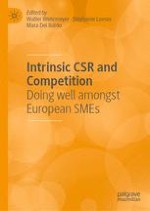2020 | OriginalPaper | Buchkapitel
11. Virtue Ethics, Values of the Founders, and Organizational Growth
verfasst von : Josh Wei-Jun Hsueh
Erschienen in: Intrinsic CSR and Competition
Verlag: Springer International Publishing
Aktivieren Sie unsere intelligente Suche, um passende Fachinhalte oder Patente zu finden.
Wählen Sie Textabschnitte aus um mit Künstlicher Intelligenz passenden Patente zu finden. powered by
Markieren Sie Textabschnitte, um KI-gestützt weitere passende Inhalte zu finden. powered by
